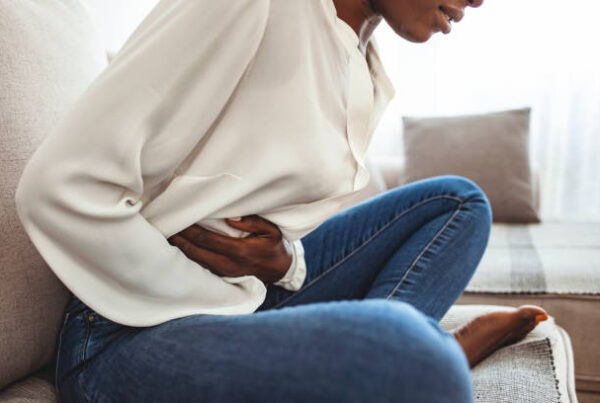At times, fibroids can make having sexual intercourse with your partner an uncomfortable experience, and if you have large or multiple fibroids you might feel pain during sex. The painful intercourse can affect your libido; you may find yourself less interested in intercourse, knowing that it’ll hurt. Speak with your doctor if sex is painful for you. While the cause could be uterine fibroids, there can be numerous other factors involved. You may also feel self-conscious about your body or less attractive, especially if you have put on weight or you look pregnant due to the size and location of the fibroids.
If your partner feels rejected or doesn’t understand your condition, it can easily cause conflict, but by having an open, honest conversation about uterine fibroids and painful intercourse, you’ll deepen your partner’s understanding of your condition—and hopefully your relationship. Every woman with fibroids experiences symptoms differently, but for some, sex is extremely painful. That pain may be due to pressure from the fibroids, vaginal dryness, or hormonal changes.
Further complicating things, fibroid pain isn’t consistent. It can become more intense at certain times of the month or in some positions. Whatever the cause of painful intercourse, it can disrupt your sex life and cause a major strain on your relationship. Severe menstrual pain and other fibroid symptoms, like urinary incontinence and exhaustion, may also affect your sex life. The heavy bleeding associated with uterine fibroids can make you feel tired and affect your concentration. You may feel embarrassed or scared of leaking through your clothing, not to mention that you may feel depressed, irritable, or anxious. All of these side effects of fibroids can have an impact on your relationship, making sex with your partner stressful.
Your partner might not have any idea what you’re going through or why you are avoiding intimacy. Taking the time to have a transparent conversation is essential for both partners. Talk to your partner about how your fibroids are causing you pain during sex, or anxiety about having sex. Open communication is especially important when discussing uterine fibroids and painful intercourse. Let your partner know how you feel and respond by acknowledging their feelings as well.
Starting a conversation about fibroids and sex can be difficult. Learn more about your condition. Your partner will probably have questions about how fibroids develop and how they affect your body. To answer them accurately, you’ll want to educate yourself on the condition. Choose the right time to talk: Don’t spring the conversation on your partner when you’re upset or don’t have enough time to discuss the issue fully. Let him know you want to talk about your health and choose a time and place that works for both of you. Make sure that you’re in a private environment that’s free from distractions. Be honest. Talk as openly as you can about your symptoms and how they specifically affect you and your sex life. Let your partner know that pain, fatigue, and heavy bleeding could interrupt your plans from time to time and that sex may be painful. Discuss ways to cope with your symptoms together.
Be supportive. When you are the one experiencing pain and other symptoms, it’s easy to forget that your partner is affected by them too. They may be experiencing many of the same emotions as you are, including anger, frustration, helplessness, and despair. Truly listen when your partner expresses their feelings and be supportive. For some women, uterine fibroids and sex are a painful combination. Up to 80 percent of women develop a uterine fibroid by age 50. While most fibroids don’t cause any symptoms, for some, uterine fibroids and painful intercourse is an all too common occurrence.
In addition to pain during sex, depending on their location, size, and number, uterine fibroids can cause heavy or irregular menstrual bleeding and muscle cramping—other setbacks for your sex life. Fibroids can affect your sex life if they cause pain during sex, pelvic pain, or heavy or painful menstrual bleeding. Some women with fibroids often experience extreme pain during sex because the fibroids are significantly associated with what is known as “deep dyspareunia,” or intercourse that is painful deep in the vagina, as opposed to the entrance.
If your fibroids are located in the upper section of your uterus you are more likely to have deep, painful intercourse. Also, deeply painful sex is more common if you have given birth, and for each delivery, the odds of deep dyspareunia increase by 30 percent. Dyspareunia is more common in younger, premenopausal women, and women with other pelvic conditions like endometriosis are nearly three times more likely to have deep dyspareunia than those without other pelvic complaints. If you are depressed, you are twice as likely to have painful intercourse. The link between uterine fibroids and painful intercourse is established.
There are many different approaches to managing and treating uterine fibroids, including watchful waiting, exercise, drug therapy, surgery, and minimally invasive treatments. There is also no surgical approach known as High-Intensity Focused Ultrasound (HIFU).
Hysterectomy—surgical removal of the uterus—can guarantee your fibroids won’t return, but it comes with all the risks of major surgery, including bleeding, blood clots, and infection. Also, after a hysterectomy, you are unable to become pregnant. If you wish to become pregnant eventually, you may want to consider a nonsurgical treatment option such as HIFU that will leave your uterus intact, and provide symptomatic relief with less risk and a shorter recovery period. Speak to your specialist to determine the best treatment for your uterine fibroid condition, including nonsurgical treatments.




